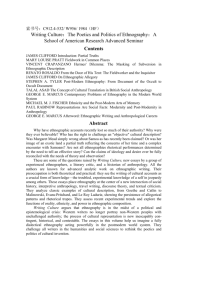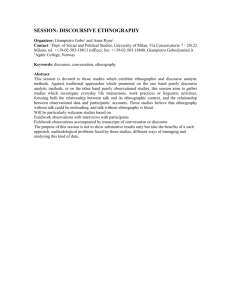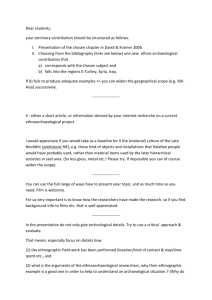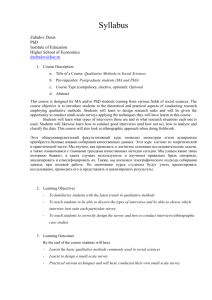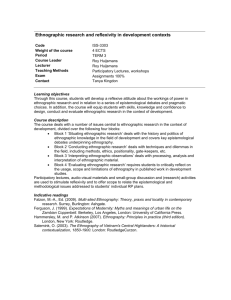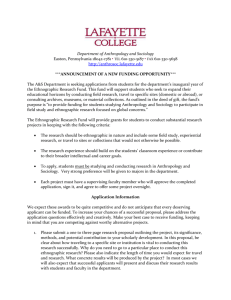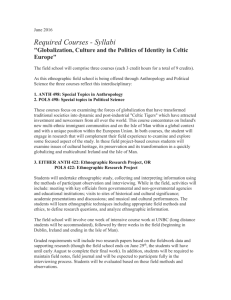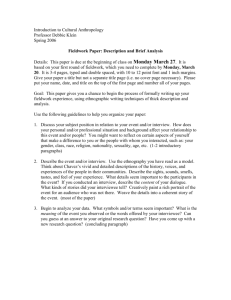Week 10 - Covenant College Sociology Department
advertisement
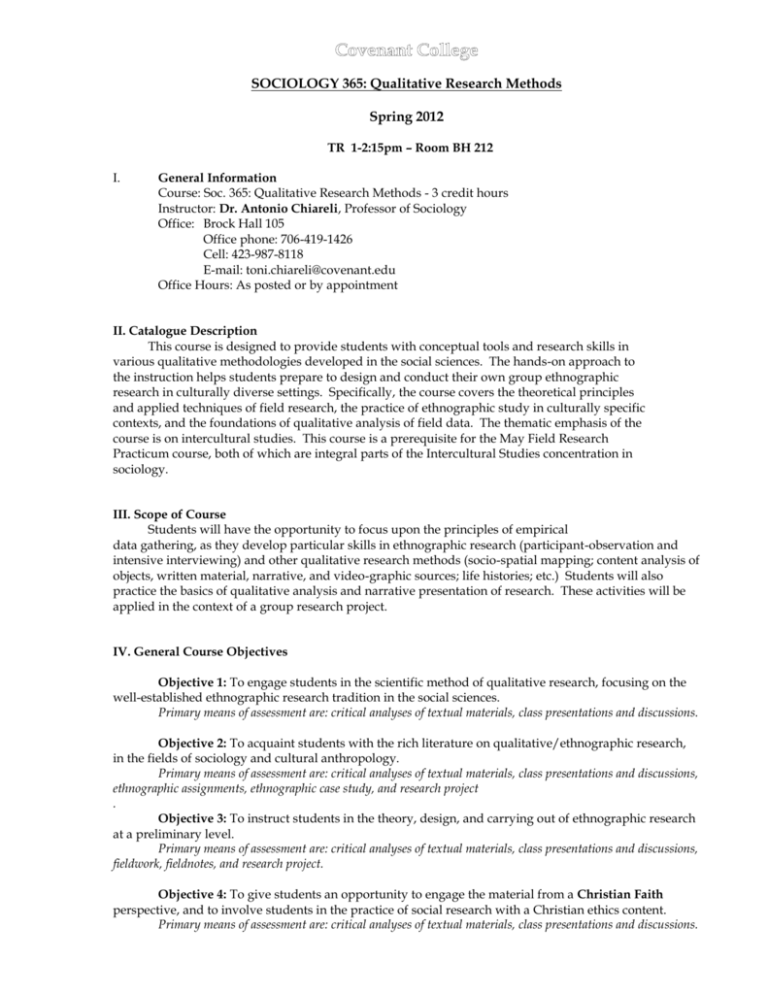
SOCIOLOGY 365: Qualitative Research Methods Spring 2012 TR 1-2:15pm – Room BH 212 I. General Information Course: Soc. 365: Qualitative Research Methods - 3 credit hours Instructor: Dr. Antonio Chiareli, Professor of Sociology Office: Brock Hall 105 Office phone: 706-419-1426 Cell: 423-987-8118 E-mail: toni.chiareli@covenant.edu Office Hours: As posted or by appointment II. Catalogue Description This course is designed to provide students with conceptual tools and research skills in various qualitative methodologies developed in the social sciences. The hands-on approach to the instruction helps students prepare to design and conduct their own group ethnographic research in culturally diverse settings. Specifically, the course covers the theoretical principles and applied techniques of field research, the practice of ethnographic study in culturally specific contexts, and the foundations of qualitative analysis of field data. The thematic emphasis of the course is on intercultural studies. This course is a prerequisite for the May Field Research Practicum course, both of which are integral parts of the Intercultural Studies concentration in sociology. III. Scope of Course Students will have the opportunity to focus upon the principles of empirical data gathering, as they develop particular skills in ethnographic research (participant-observation and intensive interviewing) and other qualitative research methods (socio-spatial mapping; content analysis of objects, written material, narrative, and video-graphic sources; life histories; etc.) Students will also practice the basics of qualitative analysis and narrative presentation of research. These activities will be applied in the context of a group research project. IV. General Course Objectives Objective 1: To engage students in the scientific method of qualitative research, focusing on the well-established ethnographic research tradition in the social sciences. Primary means of assessment are: critical analyses of textual materials, class presentations and discussions. Objective 2: To acquaint students with the rich literature on qualitative/ethnographic research, in the fields of sociology and cultural anthropology. Primary means of assessment are: critical analyses of textual materials, class presentations and discussions, ethnographic assignments, ethnographic case study, and research project . Objective 3: To instruct students in the theory, design, and carrying out of ethnographic research at a preliminary level. Primary means of assessment are: critical analyses of textual materials, class presentations and discussions, fieldwork, fieldnotes, and research project. Objective 4: To give students an opportunity to engage the material from a Christian Faith perspective, and to involve students in the practice of social research with a Christian ethics content. Primary means of assessment are: critical analyses of textual materials, class presentations and discussions. Objective 5: To apply knowledge gained through this class to real world contexts by way of empirical inquiry and an applied research project, so as to prepare students for a formal field experience in ethnographic research during May term. Primary means of assessment are: ethnographic assignments, fieldwork, fieldnotes, class presentations, and discussions. V. Required Text and Other Reading Materials There are two required textbooks for this course, in addition to one optional and four recommended texts, select ethnographic case studies, and occasional supplemental readings, which will be made available to you when necessary. Required Textbooks • Beebe, James. Rapid Assessment Process: An Introduction. Walnut Creek, CA: Altamira Press, 2001. • Creswell, John W. Qualitative Inquiry & Research Design: Choosing Among Five Approaches (2nd ed.). Thousand Oaks, CA: Sage Publications, 2007. Optional Text • Poelzl, Volker. Culture Shock! Brazil: A Survival Guide to Customs and Etiquette (3rd ed.). Tarrytown, NY: Marshall Cavendish Corp., 2009. Recommended Texts • Angrosino, Michael V. Doing Cultural Anthropology: Projects in Ethnographic Data Collection (2nd Ed.). Long Grove, IL: Waveland Press, 2007. • Esterberg, Kristin G. Qualitative Methods in Social Research. New York, NY: McGrawHill Higher Education, 2002. • Spradley, James P., and D. W. McCurdy. The Cultural Experience: Ethnography in Complex Society (2nd Ed.). Long Grove, IL: Waveland Press, 2005. VI. Methods of Instruction Lectures, audio-visual resources, fieldwork, process-oriented class presentations and discussions, sharing of research findings. VII. Assigned Reading and other Requirements Students are expected to attend every class session and to interact with the professor and the rest of the class throughout the semester. Discussions over reading assignments, film viewings, and over ethnographic practice should be dynamic and well informed. Submission of field notes and other assignments to the professor via e-mail attachments are required, and must be completed on a timely manner. Your class participation will be evaluated. Pop-quizzes based on lectures or readings may occasionally be administered. VIII. Methods of Evaluating Student Progress A. B. C. D. E. Overall Attendance and Informed Participation. Leading Discussions on readings/films. Completion of Short Assignments. Students are required to submit a brief “Practice Ethnography Proposal.” Field Research Practice: Fieldwork assignments will be conducted in teams (must include a combination participant observation/interviews/and one other research method). F. G. H. I. J. K. L. Fieldnotes: Fieldnotes will be graded according to substance and to progress made on fieldnoting technique. Group Dynamics: Teamwork will be evaluated. Ethnographic Research Project Presentation: At the end of the term, students will present tentative findings to their ethnographic project. Ethnographic Case Study Presentation. Submission of a “Summer Ethnography Proposal.” Preparations for Field Experience. Grades will be based on cumulative points through the completion of all assigned work. Attendance & Informed Participation Leading Discussion on Readings Short Fieldwork Assignments Practice Ethnography Proposal Ethnographic Research Practice and Fieldnotes Group Dynamics/Team Work Ethnograhic Res. Project Presentation Ethnographic Case Study Presentation Summer Ethnography Proposal Preparations for Field Experience 15% 10% 5% 5% 10% 10% 20% 10% 10% 5% 100% Attention: You will be evaluated on the basis of your attendance and informed participation based on lecture and readings. Be advised that a “silent” student is pleasant, but will not receive full points for informed participation. Grading Scale 93-100 90-92 87-89 83-86 80-82 77-79 73-76 70-72 67-69 63-66 60-62 Below 60 IX. A (Excellent) A- (Very Well Done) B+ (Well Done) B (Good Work) B- (Ordinary Work) C+ (Satisfactory+) C (Satisfactory) C- (Satisfactory-) D+ (Unsatisfactory+) D (Unsatisfactory) D- (Unsatisfactory-) F (Failing) Policies A. Attendance Policy: Regular class attendance is required of all students. Anyone missing more than 25% of the semester class meetings will receive an "F" for the course and may possibly be withdrawn, even if they are earning an "A" points-wise. Beware of this very important policy! B. Late Assignments: All assigned work is to be turned in on time. Lateness in turning in work will be penalized, unless you have secured valid permission from the Professor. C. Policy on Cheating/Plagiarism: Anyone caught cheating (this includes just looking at a test not your own) on exams or assignments will fail the course. Course work should reflect the sole work of the individual student unless otherwise specified by the Professor. The policy on cheating as stated in your college catalogue will be strictly enforced. D. Deviant Behavior: Absolutely no disruptive behavior or sleeping during class will be tolerated. The use of laptop computers for reasons other than directly related to the course is prohibited. Keep them closed otherwise. If, in the subjective judgment of the professor, you appear to be consistently tuning out the class and going online, or simply staring at your laptop screen, you will be counted absent for that day and it will count against your attendance. Also, students are not permitted to read or study for other classes during class time. Do not talk on your cell phone, listen to music, read or send e-mail, or text message during class. If you absolutely must communicate with others outside of class, please politely excuse yourself momentarily and promptly return to class without disrupting the lecture or class activity (do not abuse this privilege, or it will be taken away). If deviant behavior persists after fair warning, it will result in class dismissal and grade penalization, and ultimately, withdrawal from the course. E. Special Needs: Please inform the Professor if you need to be especially accommodated due to any documented special needs you may have (e.g.: learning disability, physical impairments of any sort, etc.). Every effort will be made to accommodate your needs in a discrete and appropriate manner. The professor reserves the right to deviate from this syllabus as conditions necessitate. TENTATIVE COURSE SCHEDULE Note: Class Discussions are an opportunity for us to not only develop answers to questions that arise and to deepen our understanding of the material, but also to exercise our Christian faith perspective in relation to the topics of discussion. These are therefore integral parts of our class sessions and so I ask that you make a sincere effort to participate actively. Week 1 Tues. Jan. 10: Jan. 12: Week 2 Jan. 17: Jan. 19: Week 3 Jan. 24: Jan. 26: Week 4 Jan. 31st.: Feb. 2: Introduction to the course and to each other Review Syllabus Discuss the goals of the course Initial Brazil Briefing Creswell Ch. 1: Introduction Sources of Knowledge Wheel of Knowledge Quantitative vs. Qualitative Creswell Ch. 2: Philosophical, Paradigm, and Interpretive Frameworks Group Ethnography ppt. Begin Assigning Research Groups/Discussions/Case Studies Group Field Outing Creswell Ch. 3: Designing a Qualitative Study What is Ethnography? Demography vs. Ethnography Finalize Schedules What is Ethnography? (Cont’d.) Observation Assignment Creswell Ch. 4: Five Qualitative Approaches to Inquiry Writing Fieldnotes Week 5 Feb. 7: Feb. 9: Week 6 Feb. 14: Feb. 16: Week 7 Feb. 21st.: No Class (Day of Prayer) ***Creswell Ch. 5: Five Different Qualitative Studies (Presented by Students)*** Reading: Crewell Appendices A-F Ethics in Qualitative Research Reading: Crewell Appendices A-F Interviewing Assignment Discovering Folk Terms Discovering Taxonomic Structure Typologies Creswell Ch. 6: Introducing and Focusing the Study Mapping Assignment Feb. 23: Creswell Ch. 7: Data Collection Week 8 Feb. 28: Teams workshop on field study Mar. 1st.: Week 9 Mar. 6, 8: Week 10 Mar. 13, 15: Week 11 Mar. 20, 22: Week 12 Mar. 27: Mar. 29: Teams prepare to go to the field ***Teams Submit Proposal for Practice Field Research*** No Class (Spring Break – Enjoy it to the glory of God!) Reading: Culture Shock! Brazil Fieldwork & Submit Fieldnotes Reading: Creswell Ch. 8: Data Analysis and Representation Fieldwork & Submit Fieldnotes Reading: Creswell Ch. 9: Writing a Qualitative Study Creswell Ch. 10: Standards of Validation and Evaluation ***Fieldwork Debriefings*** Creswell Ch. 11: “Turning the Story” and Conclusion ***Fieldwork Debriefings*** Week 13 Apr. 3: Apr. 5: Week 14 Apr. 10: Apr. 12: Week 15 Apr. 17: Apr. 19: Week 16 Apr. 24: Apr. 26: Assessment Day (No Class) Beebe Ch. Introduction and Ch. 1: To RAP or Not to RAP Easter Break (Apr. 6-9) ***Happy Easter!*** Beebe Ch. 2: Data Collection (Triangulation) Beebe Ch. 3: Interative Analysis and Additional Data Collection Beebe Ch. 4: Teamwork Teaming-up in Ethnographic Research ***Ethnographic Case Study Presentations*** May Term Preparations: Ivoti, Brazil (Calendar, Location, Team Roles, Methods, Topics, etc.) Beebe Ch. 5: Trusting RAP Beebe Ch. 6: Successful RAP Readings: Beebe Chs. 7, 8, and Appendices A-D. ***Ethnographic Research Reports Due*** Summing Up & Finalize for May Term: Ivoti, Brazil ***Submit Ethnographic Research Project Write-up*** No Class (Reading/Snow Day) ***Submit Summer Ethnography Proposal*** Finals Week April 27-May 2: Stay Tuned for Announcements on the exact date, place and time. HAVE A BLESSED, FRUITFUL, FUN, AND SAFE MAY PRACTICUM AND SUMMER VACATION!

